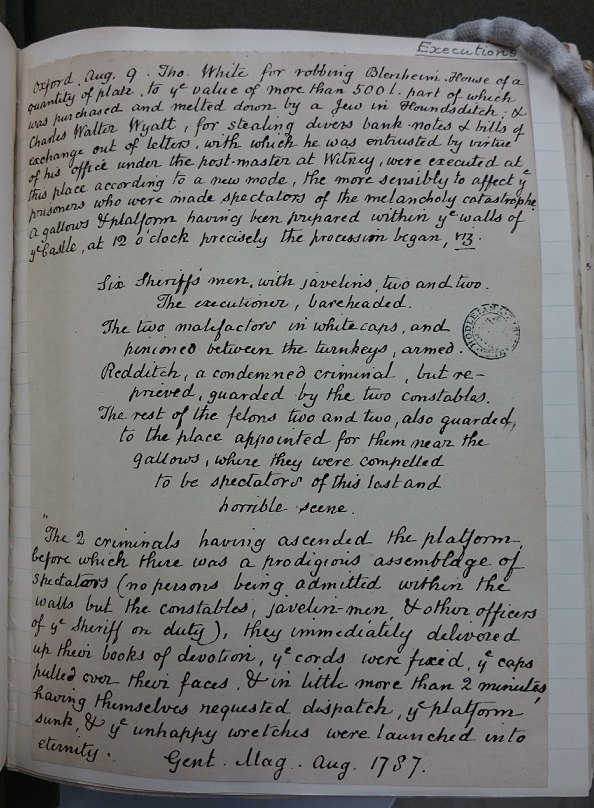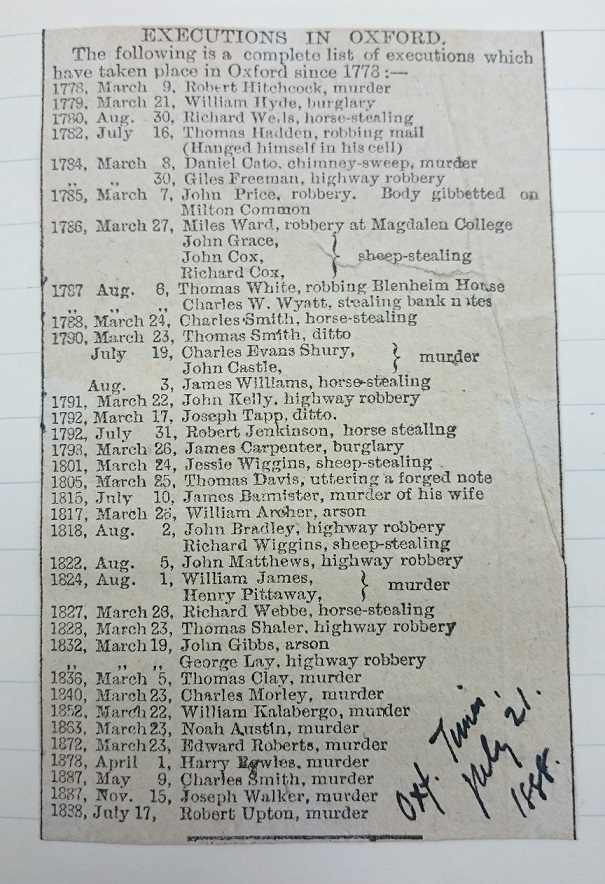Another snippet from the Percy Manning archive, this time from his ‘Oxford Collections’ scrapbooks which contain notes, newspaper clippings and assorted ephemera on topics ranging from Academic Halls to Earthquakes to Knucklebone Floors, to Lady in the Wall to …. Well, it’s wonderfully diverse!
This one is a simple clipping from the Oxford Times of 21 July 1888, and a chilling reminder of where the saying ‘you might as well be hung for a sheep as a lamb‘ comes from. A compendium of executions carried out in Oxford between 1778-1888, it lists 44 men and their capital crimes, which range from murder to… sheep-stealing.
John Grace, John Cox and Richard Cox were executed on the 27th of March 1786 for stealing sheep (joined at the gibbet by Miles Ward, whose crime was robbing Magdalen College, Oxford); Jessie Wiggins was executed for stealing sheep on the 24th of March 1801 and Richard Wiggins (a relative?) on the 2nd of August 1818. There are five horse thieves too, the last of whom was executed as late as 1827, after which the list of crimes men are executed for narrows sharply to highway robbery, arson and murder.
It’s perhaps interesting that no women were executed – it’s likely that they were transported instead – although one woman is listed, poor Mrs. Barmister, whose husband James was executed for her murder on the 10th of July 1815.
The list also includes Thomas White, who robbed Blenheim House (Palace?), and Charles Walter Wyatt, the postmaster of Witney, whose crime was stealing money from his customers’ mail. They were executed together at Oxford Castle on the 6th of August 1787 in front of ‘a prodigious assemblage of spectators’. Manning’s scrapbook includes a description of their deaths copied from Gentleman’s Magazine.

The execution of Thomas White and Charles Walter Wyatt, from MS. Top. Oxon. d. 180, fol. 68 – click to enlarge
These two particular deaths were notable because they were executed
…according to a new mode, the more sensibly to affect the prisoners who were made spectators of the melancholy catastrophe
Literally spectators – their fellow prisoners were compelled to stand near the gallows and watch. And then
the cords were fixed, the caps pulled over their faces & in little more than 2 minutes having themselves requested dispatch, the platform sunk & the unhappy wretches were launched into eternity
Unfortunately though, it looks like the Oxford Times list of 1888 is incomplete. The Oxfordshire History Centre has a fuller list here (taken from Oliver’s City of Oxford Almanack, 1929) and it adds more sad detail, including more sheep and horse thieves like Joseph Wren, aged only 17, who was executed in March 1783 for stealing a horse, bridle and saddle. And William Bowler, aged 23, executed in the same month for stealing a single sheep. Yes. Just one.
Using the Oxfordshire Record Office list for the period 1778 to 1836, I tallied:
- 1 execution for forgery
- 2 for arson
- 5 for murder
- 14 for stealing a horse or sheep
- 16 for every other kind of theft, including burglary and highway robbery
After 1836 people were executed for murder alone, 13 more executions up to 1921. 18 murders in 144 years seems like quite a small number, somehow (perhaps I’ve been watching too much Morse). Then again, nobody in these lists is being executed for manslaughter or any other killing offence. In Oxford’s courts, it seems, ending somebody’s life really did mean less risk to your neck than nicking that proverbial lamb. Grim.
This blog post is written as part of our project to increase the accessibility of the Bodleian's Percy Manning holdings in the run up to the centenary of Manning's death in 2017. We are grateful to the Marc Fitch Fund for its generous support of this project.

Interesting, thank you! I wonder why he was left off.
Also the list ommits the execution of Edward Thorne for the murder of Amy Jacob, the only execution to take place in 1800 at Oxford Goal.
Beautiful, thank you. That also somehow makes it so much more sad!
Although Manning’s list from the Oxford Times doesn’t mention William Bowler, “aged 23, executed …for stealing a single sheep. Yes. Just one.”, his manuscripts do contain (in a cache of recently identified material, G. A. Oxon c.317 (10)) some verses written by a local poet, George Busby of Kiddington, about Bowler’s crime and detection, which appears to have been rather straightforward:
Verses on William Bowler of Gadginge who was hanged at Oxford 1783 for Sheep Stealing at Kiddington.
1. Twas winter time long years ago
The ground was covered ore with snow
The old white way was white indeed
With paths that did into it lead.
2. The sheep were penned along Hell Hill
Where turnips grew as they do still
The shepherd ere he went at night
Counted & left them safe and right.
3. Next morning when he came along
He found out there was something rong
One sheep was missing from his flock
Which gave him something of a shock.
4. He found the steward and him he told
Of the departure from his fold
Who quickly brought the case before
Lady Brown Mastyn and Squire Gore.
5. The constable was set to work
To see w[h]ere sheep stealer might lurk
And by the snow upon the ground
The sheep was traced and quickly found.
6. The constable to Hell Hill came
The steward & shepherd then by name
T[h]ey saw the footprints in the snow
Which pointed out the way to go.
7. As on they went the track was clear
To Godingwell a hamlet near
The house w[h]ere William Bowler dwelt
It seemed as if the mutton smelt.
8. On entering in at dinner time
Where dwelt the man charged with the crime
What they saw then befor there eyes
At once made there suspicions rise.
9. Some mutton which appeard in sight
The inmates sought to hide out right
Beneath potatoes in a dish
But twas not quite as they could wish.
10. Now William bowler of[f] they take
Forced home friends now to forsake
In Oxford prison cell to lie
Till the assises should drawn nigh.
11. In 17 hundred and eighty three
At Oxford prison hanged was he
The penalty for many a crime
Such was the law in Williams time.
These verses were collected by Manning’s agent Thomas Carter, probably sometime in the 1890s.